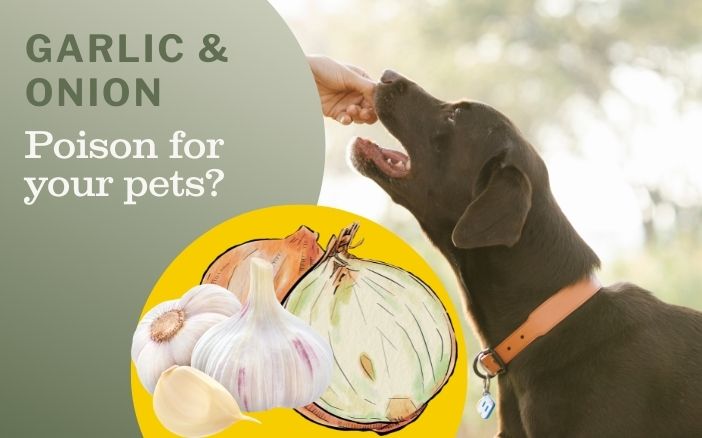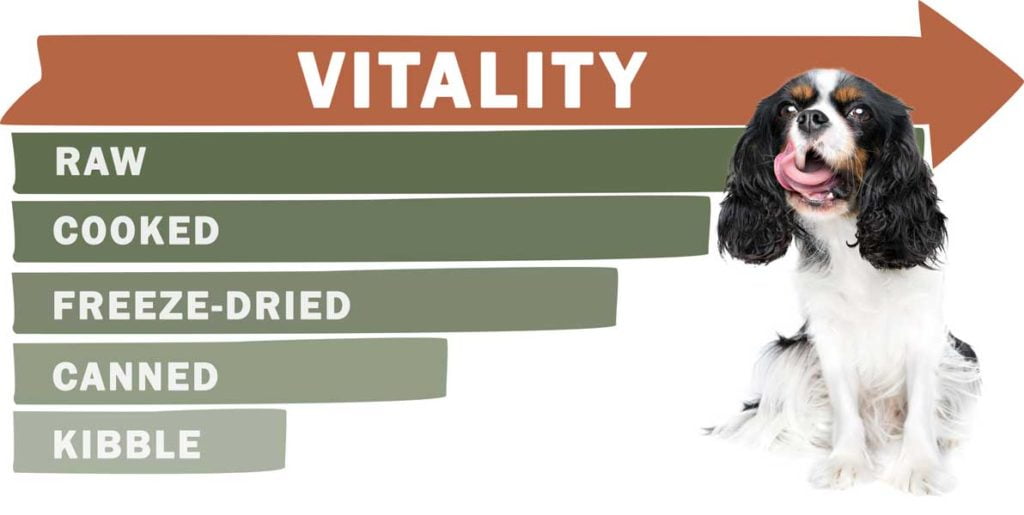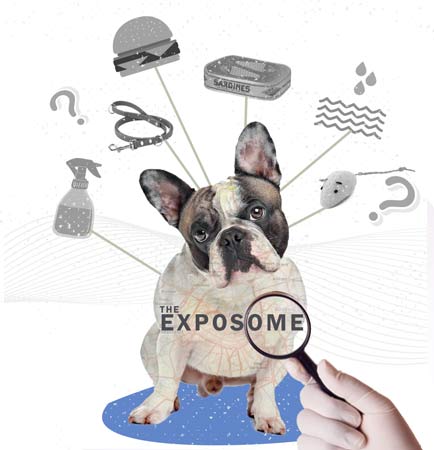08 15 2022 Empower Hour! Soothing Ears Topically
08 08 2022 Empower Hour! Cellular Health to Avoid Allergies
08 01 2022 Empower Hour! Allergies and Ears
07 25 2022 Empower Hour! Homeopathy in Emergencies
07 11 2022 Empower Hour! Holistic First Aid Kit
07 04 2022 Empower Hour! Energy Management

Are Garlic and Onions Really Poisons for Dogs and Cats?
WARNING. This article discusses feeding practices that differ from those advised by the AVMA. That’s because it uses the paradigm of a non-physical energy the AVMA and most modern scientific medicine does not yet recognize. Please read it at your own risk. Talk to your vet before feeding anything new.
IN SHORT:
- Feeding a variety of fresh foods, including garlic and onions, can promote health and happiness for pets.
- Even healthful foods can be poisonous, with most pets being affected by high doses of toxins and sensitive pets being affected by low doses.

“In food, excellent medicine can be found; in food, bad medicine can be found. Good and bad are relative.” Hippocrates made that statement in his text “De Alimento. With some imagination, this could be read as, “some foods will cure you, other foods will make you sicker, and the same reaction is not found in all of the people (or pets) all of the time.” In most cases, food can be medicine that helps keep pets and people well and supports healing when there is dis-ease. In all cases, fresh food is the most biologically active and supportive, in much the same way that pharmacologic medicines work best before their expiration date.
However, the current standard veterinary practice is to feed the same type of commercial ultra-processed dry and canned pet food for the duration of your pet’s life. But that’s not how animals eat in nature. Animals that are hunters and scavengers ( dogs and cats) eat a varied diet. Sticking with one professionally formulated, scientifically balanced commercial pet food is consumer-friendly and fine for most pets. However, some pets need more nutritional support. In those cases, the pet parent may try feeding fresh, or even raw, food.
Feeding fresh food has many benefits and may extend the life of dogs and cats. Feeding a variety of foods supplies vital nutrients, and can reveal a variety of your pet’s food cravings and aversions.
This brings us to the question: “How can healthful foods such as onions, garlic, and avocados also be poisons?”
Understandably, many pet parents are fearful of offering human food to their pets because it may be poisonous to them. However, foods that are good for us are usually good for our pets, as well…. with a few exceptions.
allium species (garlic, onions, and leeks) contain a compound (N-propyl disulfide) that can be toxic and cause the destruction of red cells. However, this compound is not technically poisonous to pets.
True poisons are toxic even in small amounts like antifreeze, which contains very dangerous ingredients (ethylene glycol, methanol, and propylene glycol).
This can be confusing for some holistic-oriented pet parents who are trying to decide what’s best for their beloved companions. Fortunately, clarity comes from using just two intuitive factors.
Before I mention them, I want to remind you that the intent of this article is not to recommend feeding any specific food. My intent is to help promote pet happiness and quality of life with the Holistic Medical Decision Making (HMDM) protocol. This protocol uses both scientific and nature-based information to extract the best of both worlds.
Considering both types of information often highlights the disconnect between medicine and healing. Fortunately, we are able to re-connect these areas with just two pieces of information (“intuitive factors”) about food that can help you decide what is best for your pet.
Intuitive Factor #1: some foods contain potentially toxic ingredients. I use the term “potentially toxic” because the same food may trigger an adverse reaction in one pet but not in another.
Consider this: even water in large enough doses can be toxic.
It’s possible for any food to contain tiny amounts of a potential toxin. However, sizeable amounts would need to be fed to reach a toxic level. Generally, most pets will never eat enough of the food or substance to cause a problem.
Contrast this with foods like chocolate, which can be toxic even in small amounts. That’s because the potential toxin in chocolate (theobromine) is more potent and can trigger more problems. However, even this is dose-related, with dark and bittersweet chocolate containing higher doses of problematic ingredients than milk chocolate.
Archie (my beloved dog) ate a plate of milk chocolate cookies and didn’t get sick at all. However, this “dietary indiscretion” could have triggered big problems for another pet.
Unlike chocolate, most other foods do not contain substances that can cause strong adverse reactions. Ask the folks at Earth Animal or the manufacturers of Bug Off Garlic about the safety of garlic for pets, as an example. Many thousands of pets have safely eaten their garlic products to ward off fleas and ticks.
(Click/tap here for the forum thread where the Holistic Actions! community is discussing garlic and toxicity.)
That’s because of Intuitive Factor #2: individuality. We’ll discuss “individuality” and food sensitivities more below, but there are many other resources available about Individuality throughout the resources on this site.
Individuality and Food Sensitivity
Some pets are super-sensitive to garlic. One dog might develop life-threatening immune-mediated anemia just from eating a slice of pizza with added garlic powder. Some cats might have a reaction to small amounts of baby food flavored with garlic.
The difference between pets with “iron stomachs” who can eat anything and those who are super sensitive to many foods is individual susceptibility.
Susceptibility is also called sensitivity and it is why one pet reacts to a food that does not affect another. Recognizing and respecting this can help pets have happier lives with fewer trips to the vet.
 Individual susceptibility is being described in scientific terms using the growing understanding of the exposome. Molecular biologists define it as the total of all molecular processes in the body in response to exposure to potential triggers like toxins in food.
Individual susceptibility is being described in scientific terms using the growing understanding of the exposome. Molecular biologists define it as the total of all molecular processes in the body in response to exposure to potential triggers like toxins in food.
However, to fully understand susceptibility requires a leap beyond the current “flat earth” medical model of Western veterinary medicine. Before people knew that the earth was round, it was foolhardy to sail beyond the horizon. Similarly, the goals of personalized medicine (matching treatments to each individual) or safely feeding a varied fresh-food diet might seem like unattainable goals.
Now is the best time in history to sail beyond the horizon – in deciding how to feed pets, reducing individual susceptibility, or increasing resistance to infections such as SARS-CoV-2.
It’s All About Energy
There’s a small problem with this journey around the globe, however. Scientists can not fully utilize susceptibility or individuality, partially because the current understanding of life is based on physical energy. Energy, like ATP molecules made by mitochondria, lets cells do jobs like not being over-sensitive to foods.
This limits scientists to only treating patients using “flat earth medicine” that portends that one size (or food) fits all.
Traditional Chinese medicine, Ayurvedic, and homeopathic doctors use a paradigm of non-physical energy (called chi, prana, or the vital force) in addition to the physical energy paradigm. This gentle and effective medical system that is based on non-physical energy allows veterinarians and human physicians that use both paradigms to understand and use individuality and susceptibility when working with their patients to explain why one individual gets sick or has an adverse reaction, and another does not.
Without complete knowledge of susceptibility and energy, it’s impossible to fully understand dis-ease.
For example, using the “flat earth” medical modal, it’s impossible to explain why two pets in the same run at a kennel but only one gets sick. Understanding susceptibility and energy allows us to comprehend why garlic and onions are toxic to one pet but not another.
Grapes and raisins are two more examples of this individual sensitivity. They don’t contain any known toxins and are safely eaten, sometimes in large amounts, by pets around the world.
However, conventional veterinary science cannot explain why one individual may develop kidney failure from eating just one grape while many others like Lola (identifier) can eat many grapes and not get sick.
Disclaimer: It’s safest not to feed grapes or raisins in any amount.
Personalized medicine is based on individualized responses like these, and is a current hot topic in modern medicine. Modern medicine is just now beginning to tailor food and drugs for the individual. Susceptibility and sensitivity can be difficult to understand in detail, but just knowing that they exist might be enough for now.
When considering food variety and choices, knowledge of potentially toxic ingredients, as well as individual sensitivities, using HMDM will help clarify your decisions.
Ask your vet about your pets’ individual susceptibility and if there could be potential problems with every drug s/he wants to prescribe.
